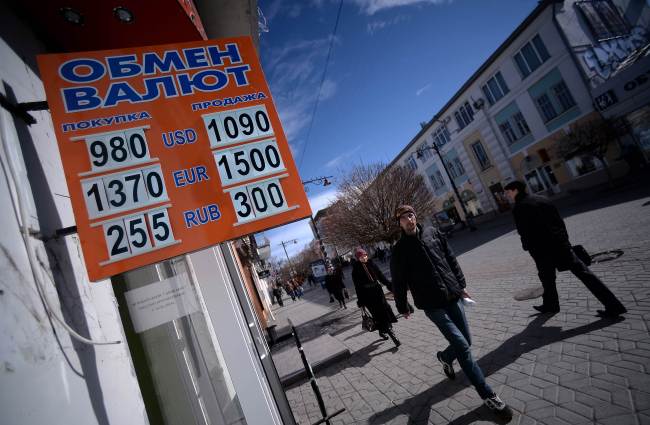WASHINGTON (AFP) ― Six years after a wave of financial destruction crashed through the United States and then Europe, risks, some old and some new, still challenge the global economy, the IMF says.
In reviews of global fiscal and financial sector stability released Wednesday, the International Monetary Fund said gains had been made to repair budgets in advanced economies, and to shore up banking systems.
But governments remain highly in debt, and emerging economies are starting to pile up risky deficits.
Banks in Europe are still weak. And new risks are cropping up in finance due to the long period of easy-money from the U.S. and European central banks.
“Global financial stability is improving ― we have begun to turn the corner. But it is too early to declare victory,” said Jose Vinals, IMF financial counselor and director of its Monetary and Capital Markets Department.

A man walks past a foreign currency exchange office in Simferopol on March 17. (AFP-Yonhap)
Vinals said that, generally speaking, good policies have placed the United States, Europe and emerging economies in the right direction.
But each faces its own challenges that need close monitoring and management, he said.
In the United States, the pullback from a half-decade of ultra-easy money policies needs to take place smoothly and enhance the current sluggish pace of growth, Vinals said.
At the same time, he warned, a bumpy exit from the crisis policies could expose a new set of problems in U.S. finance: rising risk-taking on the back of cheap funding.
“We continue to track growing hot spots in the U.S. financial system,” he said, pointing to rising levels of high-yield bond issuance, leveraged loans, and falling underwriting standards.
“Supervisory measures, while now more intense, have not yet sufficiently restrained some of these excesses.”
In Europe, the IMF said, banks and businesses are still weak, the banks holding large non-performing loans and still-inadequate capital levels, and companies laden with debt.
Together that is stalling the recovery of the region and especially the periphery economies.
On a different point in the economic cycle, China is just beginning to deal with its little-regulated non-bank financiers, who now lend as much as 40 percent of gross domestic product, much of it feared to be for speculative investment.
“Achieving an orderly deleveraging of the shadow banking system is a key challenge,” Vinals said.
On the fiscal side, meanwhile, the advanced economies have nearly halved their deficits since the peak of the crisis, to a level of about 3.5 percent of GDP.
But the same group still carries a huge debt burden, which on average will still top 100 percent of GDP in 2019, said IMF Fiscal Affairs Department acting director Sanjeev Gupta.
“Fiscal consolidation must continue at a steady and gradual pace to lower debt ratios to prudent levels,” he said. The IMF wants these countries to lay out and implement clear plans to bring budgets into line. However, Gupta pointed out, both Japan and the United States have yet to do this.
Meanwhile emerging-market economies are facing pressure as the U.S. tightens policy, draining investment and raising debt costs.
“The environment faced by emerging economies has turned more challenging,” said Gupta.
“Those emerging market economies with large debt and deficits and most vulnerable to market volatility should start to rein in deficits now. In other emerging-market economies, fiscal reforms are still needed, even if with less urgency.”



![[KH Explains] No more 'Michael' at Kakao Games](http://res.heraldm.com/phpwas/restmb_idxmake.php?idx=645&simg=/content/image/2024/04/28/20240428050183_0.jpg&u=20240428180321)


